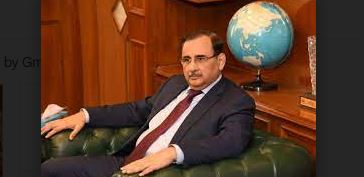ISLAMABAD, NOV 27 /DNA/ – The Businessmen Panel (BMP) of the Federation of Pakistan Chambers of Commerce & Industry has asked the government to rescue the economy out of tailspin, which is dangerously slowing down while currency crisis is also worsening, as there is a limit for businesses to absorb growing cost and enhanced taxation pressure.
FPCCI former president and BMP Chairman Mian Anjum Nisar said that the wider impact of inflation in demand destruction is visible, with the country facing unprecedented balance-of-payments troubles over diminishing foreign exchange cover and drying dollar inflows -unable to control soaring inflation or rectify the weakening exchange rate.
He said that limited fiscal space indicates that the government is not in a position to help millions of flood victims by warding off hunger and disease, let alone begin reconstruction of damaged infrastructure across the country. On top of that, the political turmoil is deepening negative perceptions about the near- to medium-term economic and currency outlook.
He said that the odds of Pakistan, facing a currency crisis, surpassed 50% after devastating floods lashed the country, killing hundreds and displacing millions. Quoting the reports, he said that the possibility of a currency crisis involving a large depreciation of the nominal exchange rate and extensive depletion of foreign-exchange rates could rise to approximately 59% in June 2023, compared to 29% in August 2022.
The BMP Chairman said that it is nothing short of a miracle that a nation of 220m souls has not experienced a full-blown currency crisis like Sri Lanka so far. In spite of being based on Pakistan’s key economic and financial data, the experts still signify perceived risks, just like the credit default swap, rather than something imminent.
Anjum Nisar said that a terrifying gas crisis is in the offing while economic growth is tanking while SBP’s policy of controlling imports through restricted LCs issuance is yielding in terms of controlling the current account deficit. However, the cost is low growth, lower tax collection and higher unemployment.
This is not helping in managing the fiscal deficit. The IMF is asking for more fiscal measures which will inevitably result in a fresh round of taxation. There is a case of even higher levies on petroleum. Sooner or later gas prices would be revised upward as well. The development expenditure must be curtailed further. All these are likely to worsen PML-N’s and Dar’s popularity graph.
Then there is the problem of financing the external account gap. IMF wants the foreign exchange reserves at higher levels. But the inflows have dried up. The IMF review is stuck. And without IMF’s nod, World Bank money is stuck too. The grapevine is that there is nothing coming in the form of investment from Qatar or the UAE. Situation is unclear on the commitments from Saudi Arabia and the response from China on debt restructuring is also uncertain.
The bottom line is that the Finance Minister’s bets are not working out for him anymore, as the situation demands some stability on the political front for friends and markets to have any confidence in Pakistan’s economic revival. Tougher decisions are required for the IMF review. The need is to do different, as the government has to move from controlled economy formula to reform-based or leave the job for someone else to do what’s necessary to help improve economy.
Pakistan secured a $1.1 billion loan from the International Monetary Fund (IMF) in late August to avoid an imminent default, but deadly floods wrought damages of about $30 billion. Islamabad since then has made an urgent appeal for debt relief.
The Pakistani currency fell almost 20% this year as finances worsened. Pakistan’s optimism since the IMF loan faded, with dollar bonds dropping to a record low.
The country observed immense damage to agricultural land and crops and may have to spend $3 billion to buy cotton as small factories shut down due to a shortage. The burden came forth during Pakistan’s restrictions on imports as the country makes an effort to reduce its trade deficit.
Floods will widen the current-account deficit because of higher food imports and a hit to exports, he said. Amid depleting foreign reserves and rising inflation, Pakistan once again urged the IMF to ease its harsh program conditions that require the country to further increase electricity prices and taxes on fuel over the next six months in return for the remaining loan of nearly $3 billion.

















